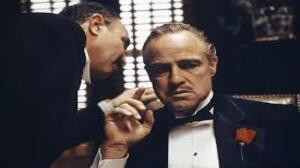The Godfather

A cinematic hat trick is credited to a filmmaker who connects on three straight movies, a rare, though certainly not unprecedented, achievement. Considering the time, effort and ultimate luck needed to complete a single successful film, each one of these filmmakers leave behind an accomplishment that cannot be denied.
For this website, I am going to focus on discovering the auteurs who have done one better – delivering four essential movies one after the other (or close to it, with an occasional “fifth wheel” film inside a streak displaying some of a director’s purest ambition). In some cases, the streak begins with a masterpiece, and is followed by a more personal statement. In others, the first film is the idiosyncratic one, and an unmitigated classic arrives later. Most directors who have this achievement experienced it early in their career, while a few had it occur after they had established their personal style. Point being – no two filmmakers have done it the same way, with each paving their own unique path to immortality. I hope to find these masters organically, allowing each artist’s work to develop as audiences did at the time, without looking ahead to the end of their journey. And there is no better person to begin with than Francis Ford Coppola. During the 1970s, Coppola accumulated what is possibly the greatest single decade in film history, with a hand in films which would garner Oscar gold, achieve box office glory, and in most cases accomplish both (beginning in 1970 with his Oscar winning screenplay for that year’s Best Picture champion “Patton”). But this story begins in 1972, when Coppola was still a young filmmaker with unbridled vision but limited opportunity.
There was no sign that an immense talent was on the horizon when he was chosen to helm the adaptation of the pulp crime novel “The Godfather”. However, it is difficult to overstate the immense cultural impact that “The Godfather” had on the moviegoing public. In 1965, the crown for highest grossing motion picture was held by “The Sound of Music”, which had taken the crown (by a slim margin) from “Gone with the Wind”. But audience taste was shifting – away from studio historical epics and musicals toward more anti-establishment and personal stories. Releases such as “The Graduate”, “Butch Cassidy and the Sundance Kid” and “Love Story” had taken an independent production mindset, and their distribution by major studios foretold a different model for the industry, solidified by each of these films becoming the top grossing movie in their respective years.
In the end, it was “Love Story” that had the most direct impact on “The Godfather”. Shepherded from its inception by producer Robert Evans, this small movie based on a bestselling novel was an immediate and unqualified smash. However, Evans did not produce this film on the outskirts and tour the major studios for a distributor. Amazingly, he staged the revolution from within – as head of Paramount Studio (at the time the lowest grosser of all the majors).
Paramount had taken a chance on Evans and was rewarded with the returns on its “Love Story” investment. Using the capital accrued from this hit, as well as his success with the adaptation of “Rosemary’s Baby” two years earlier, the next novel on Evans list was Mario Puzo’s latest, and his choice to helm was the largely untested Coppola. After a difficult production, “The Godfather” would go on to crush all box office records and win three Academy Awards, including Best Picture.
Released over fifty years ago, with a period setting and a classical aesthetic, “The Godfather” is both modern and timeless, which keeps it evergreen upon revisits. A parable, and eulogy, for no less than America itself, it is told through the story of one family. Or more accurately, through the story of a father and a son. Brilliantly portrayed by Marlon Brando and Al Pacino, they would in essence split a lead performance, with focus switching midway from the older man to the younger. Brando would famously win and refuse the Lead Actor award, while Pacino (after protesting his inclusion as a Supporting Actor) would lose the prize in an upset to Joel Grey, possibly impacted by a vote split with both James Caan and Robert Duvall. Amazingly, this would not be the last, or biggest, Oscar snub for Pacino.
Upon rewatch, it is the inevitability with which Michael finds himself trapped on the path from good man to bad that lifts the film from morality tale to Shakespearian tragedy. From its opening scene and powerful “I believe in America” monologue, Coppola presents an American dream that has failed its people, leaving them with little choice but to seek justice outside the system. Initially emblematic of the U.S. ideal, down to his military dress and Anglo-Saxon girlfriend, Michael clearly has no inclination toward a life of crime, organized or not. The failed attempt on Vito casts Michael’s lot, forcing him to choose family over country. With an eventual exile and new wife in Sicily, he appears to have shed the last vestiges of America’s empty promises, before his bride’s murder pulls him back in. It is this turn, borne more of circumstance than choice, that returns him to America, his initial love Kay and the legacy of his father, sealing his final destiny.
In the film’s emotional climax, ghost written by Robert Towne and delivered poetically by Brando, Vito eloquently expresses his feelings as father and son share one last conversation. Confessing “I always thought that when it was your time, that you would be the one to hold the strings”, the film’s themes are brought to their inevitable conclusion. Expressing his hope for Michael to attain power and influence through legitimate politics, while also conceding the realization that this dream remains unattainable due to the inescapable grip of the family’s criminal legacy, the moment poignantly encapsulates the film’s exploration of ambition, societal acceptance and ultimately unfulfilled aspirations of transcending underworld roots in a corrupt and rotting garden.

7 thoughts on “The Godfather”
Pingback: The Exorcist - Cinema Thing
Pingback: The Godfather Part II - Cinema Thing
Pingback: Jaws - Cinema Thing
Pingback: The Deer Hunter - Cinema Thing
Pingback: One from the Heart - Cinema Thing
Pingback: Taxi Driver - Cinema Thing
Pingback: Francis Ford Coppola (1972-1982) - Creative Blog